#fertilisers News

Waste
Indonesian organic waste recycler Temesi closes, co-founder blames ‘unfair’ fertiliser subsidies
The company partly financed by carbon credits was producing 30 tonnes of compost a day, but couldn’t sell it, said co-founder Sean Nino.

Food & Agriculture
Can Jambi’s farmers offer the world a model of sustainable agriculture and reforestation?
While it might be a temporary solution, the use of palm oil credits, facilitated by leading certifier RSPO, has been crucial in funding sustainable production and regenerative agricultural efforts, say smallholders and industry observers.

Football, the world's most popular sport, is getting bigger but can it cut CO2 emissions to meet green pledges for sustainability?

Communities are resisting plans for more potash mines, which have allegedly polluted the surrounding water and soil.
Food & Agriculture
From farm to fork, UN plan targets fair cuts to food emissions
Carbon & Climate
Indian farmers rack up carbon credits with climate-conscious ways
Food & Agriculture
Women farmers shine as 'super-heroes' in India's climate fight
Food & Agriculture
In India, 'natural farming' draws young people back to the land
#fertilisers Opinion

Food & Agriculture
The hunger profiteers
It is hard to predict when exactly food prices will spike again, but there is little doubt that more shocks will come. The consequences are likely to be compounded if a few companies still hold inordinate power over the world’s food systems.

Food & Agriculture
Governing the right to food
By emphasising a multi-stakeholder approach to political decision-making, international institutions have enabled corporate actors to dominate the conversation about how and what we eat. But addressing hunger and malnutrition requires a strategy that focuses on human rights and government accountability.

Food & Agriculture
Will Asia take the lead in fighting the world food crisis through insects?
Asia is the ideal insect farming hub, says the chief technology officer of insect farming start-up FlyFeed, which recently announced that it will build its first farm in Vietnam this year.

Food & Agriculture
Fertiliser security for food security in Southeast Asia: Going local and circular
Southeast Asia is highly dependent on a volatile global supply of synthetic fertilisers. Local fertiliser production by natural means, through novel innovations, offer more sustainable alternatives worthy of policy action.
Food & Agriculture
The second green revolution will be digitised
Food & Agriculture
Food security is national security
Food & Agriculture
How technology can help address challenges in agriculture
#fertilisers Videos

Designed with nanotechnology, the portable toilet recycles human waste into fertiliser without the need for water or electricity. Here's how.

Food & Agriculture
Philips lights the way for indoor commercial farming
Philips, in partnership with Chicago-based Green Sense Farms, has created one of the largest indoor commercial farms using an innovative lighting technology that consumes less energy while producing higher and fresher yields.
#fertilisers Podcasts

Food & Agriculture
Can plant-based diets save the planet?
Humanity and the planet are suffering from a serious case of food poisoning. Eco-Business spoke to Brent Loken, WWF's global lead food scientist, about how changes to our diet can help fix our broken food system, and restore our health and the planet's strained ecosystems.
#fertilisers Press Releases

Pandawa Agri Indonesia
Pandawa Agri Indonesia encourages agricultural transformation in Malaysia

Korea Maritime & Ocean University
Towards affordable clean energy: exploring new catalysts for urea-based fuel cells















